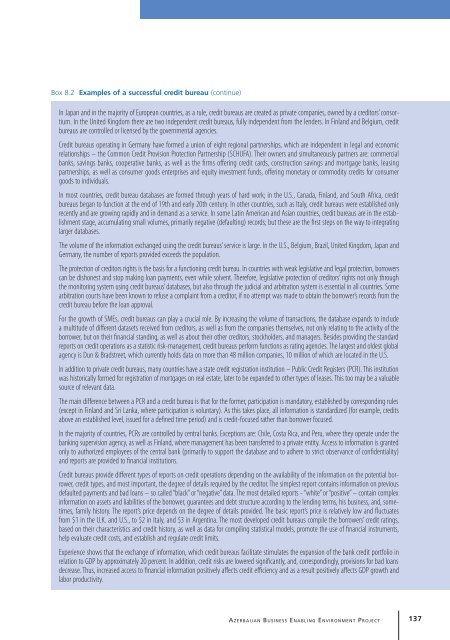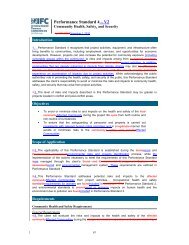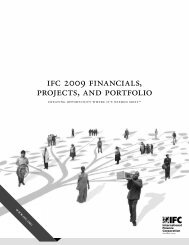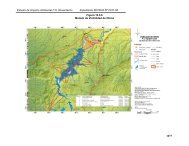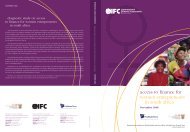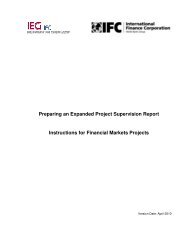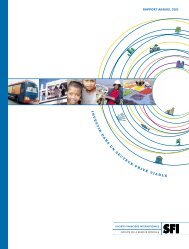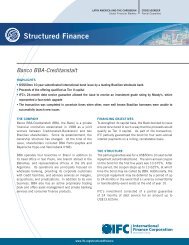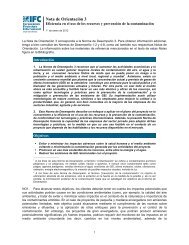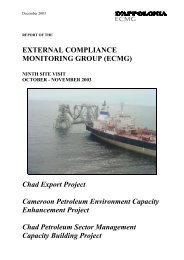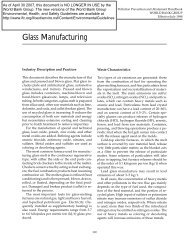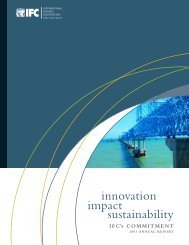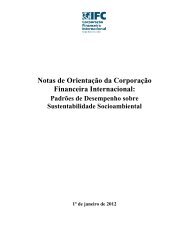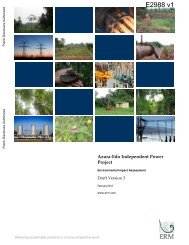Study of Small and Medium Enterprises in Azerbaijan - IFC
Study of Small and Medium Enterprises in Azerbaijan - IFC
Study of Small and Medium Enterprises in Azerbaijan - IFC
You also want an ePaper? Increase the reach of your titles
YUMPU automatically turns print PDFs into web optimized ePapers that Google loves.
Box 8.2 Examples <strong>of</strong> a successful credit bureau (cont<strong>in</strong>ue)<br />
In Japan <strong>and</strong> <strong>in</strong> the majority <strong>of</strong> European countries, as a rule, credit bureaus are created as private companies, owned by a creditors’ consortium.<br />
In the United K<strong>in</strong>gdom there are two <strong>in</strong>dependent credit bureaus, fully <strong>in</strong>dependent from the lenders. In F<strong>in</strong>l<strong>and</strong> <strong>and</strong> Belgium, credit<br />
bureaus are controlled or licensed by the governmental agencies.<br />
Credit bureaus operat<strong>in</strong>g <strong>in</strong> Germany have formed a union <strong>of</strong> eight regional partnerships, which are <strong>in</strong>dependent <strong>in</strong> legal <strong>and</strong> economic<br />
relationships – the Common Credit Provision Protection Partnership (SCHUFA). Their owners <strong>and</strong> simultaneously partners are: commercial<br />
banks, sav<strong>in</strong>gs banks, cooperative banks, as well as the firms <strong>of</strong>fer<strong>in</strong>g credit cards, construction sav<strong>in</strong>gs <strong>and</strong> mortgage banks, leas<strong>in</strong>g<br />
partnerships, as well as consumer goods enterprises <strong>and</strong> equity <strong>in</strong>vestment funds, <strong>of</strong>fer<strong>in</strong>g monetary or commodity credits for consumer<br />
goods to <strong>in</strong>dividuals.<br />
In most countries, credit bureau databases are formed through years <strong>of</strong> hard work; <strong>in</strong> the U.S., Canada, F<strong>in</strong>l<strong>and</strong>, <strong>and</strong> South Africa, credit<br />
bureaus began to function at the end <strong>of</strong> 19th <strong>and</strong> early 20th century. In other countries, such as Italy, credit bureaus were established only<br />
recently <strong>and</strong> are grow<strong>in</strong>g rapidly <strong>and</strong> <strong>in</strong> dem<strong>and</strong> as a service. In some Lat<strong>in</strong> American <strong>and</strong> Asian countries, credit bureaus are <strong>in</strong> the establishment<br />
stage, accumulat<strong>in</strong>g small volumes, primarily negative (default<strong>in</strong>g) records; but these are the first steps on the way to <strong>in</strong>tegrat<strong>in</strong>g<br />
larger databases.<br />
The volume <strong>of</strong> the <strong>in</strong>formation exchanged us<strong>in</strong>g the credit bureaus’ service is large. In the U.S., Belgium, Brazil, United K<strong>in</strong>gdom, Japan <strong>and</strong><br />
Germany, the number <strong>of</strong> reports provided exceeds the population.<br />
The protection <strong>of</strong> creditors rights is the basis for a function<strong>in</strong>g credit bureau. In countries with weak legislative <strong>and</strong> legal protection, borrowers<br />
can be dishonest <strong>and</strong> stop mak<strong>in</strong>g loan payments, even while solvent. Therefore, legislative protection <strong>of</strong> creditors’ rights not only through<br />
the monitor<strong>in</strong>g system us<strong>in</strong>g credit bureaus’ databases, but also through the judicial <strong>and</strong> arbitration system is essential <strong>in</strong> all countries. Some<br />
arbitration courts have been known to refuse a compla<strong>in</strong>t from a creditor, if no attempt was made to obta<strong>in</strong> the borrower’s records from the<br />
credit bureau before the loan approval.<br />
For the growth <strong>of</strong> SMEs, credit bureaus can play a crucial role. By <strong>in</strong>creas<strong>in</strong>g the volume <strong>of</strong> transactions, the database exp<strong>and</strong>s to <strong>in</strong>clude<br />
a multitude <strong>of</strong> different datasets received from creditors, as well as from the companies themselves, not only relat<strong>in</strong>g to the activity <strong>of</strong> the<br />
borrower, but on their f<strong>in</strong>ancial st<strong>and</strong><strong>in</strong>g, as well as about their other creditors, stockholders, <strong>and</strong> managers. Besides provid<strong>in</strong>g the st<strong>and</strong>ard<br />
reports on credit operations as a statistic risk-management, credit bureaus perform functions as rat<strong>in</strong>g agencies. The largest <strong>and</strong> oldest global<br />
agency is Dun & Bradstreet, which currently holds data on more than 48 million companies, 10 million <strong>of</strong> which are located <strong>in</strong> the U.S.<br />
In addition to private credit bureaus, many countries have a state credit registration <strong>in</strong>stitution – Public Credit Registers (PCR). This <strong>in</strong>stitution<br />
was historically formed for registration <strong>of</strong> mortgages on real estate, later to be exp<strong>and</strong>ed to other types <strong>of</strong> leases. This too may be a valuable<br />
source <strong>of</strong> relevant data.<br />
The ma<strong>in</strong> difference between a PCR <strong>and</strong> a credit bureau is that for the former, participation is m<strong>and</strong>atory, established by correspond<strong>in</strong>g rules<br />
(except <strong>in</strong> F<strong>in</strong>l<strong>and</strong> <strong>and</strong> Sri Lanka, where participation is voluntary). As this takes place, all <strong>in</strong>formation is st<strong>and</strong>ardized (for example, credits<br />
above an established level, issued for a def<strong>in</strong>ed time period) <strong>and</strong> is credit-focused rather than borrower focused.<br />
In the majority <strong>of</strong> countries, PCRs are controlled by central banks. Exceptions are: Chile, Costa Rica, <strong>and</strong> Peru, where they operate under the<br />
bank<strong>in</strong>g supervision agency, as well as F<strong>in</strong>l<strong>and</strong>, where management has been transferred to a private entity. Access to <strong>in</strong>formation is granted<br />
only to authorized employees <strong>of</strong> the central bank (primarily to support the database <strong>and</strong> to adhere to strict observance <strong>of</strong> confidentiality)<br />
<strong>and</strong> reports are provided to f<strong>in</strong>ancial <strong>in</strong>stitutions.<br />
Credit bureaus provide different types <strong>of</strong> reports on credit operations depend<strong>in</strong>g on the availability <strong>of</strong> the <strong>in</strong>formation on the potential borrower,<br />
credit types, <strong>and</strong> most important, the degree <strong>of</strong> details required by the creditor. The simplest report conta<strong>in</strong>s <strong>in</strong>formation on previous<br />
defaulted payments <strong>and</strong> bad loans – so called “black” or “negative” data. The most detailed reports - “white” or “positive” – conta<strong>in</strong> complex<br />
<strong>in</strong>formation on assets <strong>and</strong> liabilities <strong>of</strong> the borrower, guarantees <strong>and</strong> debt structure accord<strong>in</strong>g to the lend<strong>in</strong>g terms, his bus<strong>in</strong>ess, <strong>and</strong>, sometimes,<br />
family history. The report’s price depends on the degree <strong>of</strong> details provided. The basic report’s price is relatively low <strong>and</strong> fluctuates<br />
from $1 <strong>in</strong> the U.K. <strong>and</strong> U.S., to $2 <strong>in</strong> Italy, <strong>and</strong> $3 <strong>in</strong> Argent<strong>in</strong>a. The most developed credit bureaus compile the borrowers’ credit rat<strong>in</strong>gs,<br />
based on their characteristics <strong>and</strong> credit history, as well as data for compil<strong>in</strong>g statistical models, promote the use <strong>of</strong> f<strong>in</strong>ancial <strong>in</strong>struments,<br />
help evaluate credit costs, <strong>and</strong> establish <strong>and</strong> regulate credit limits.<br />
Experience shows that the exchange <strong>of</strong> <strong>in</strong>formation, which credit bureaus facilitate stimulates the expansion <strong>of</strong> the bank credit portfolio <strong>in</strong><br />
relation to GDP by approximately 20 percent. In addition, credit risks are lowered significantly, <strong>and</strong>, correspond<strong>in</strong>gly, provisions for bad loans<br />
decrease. Thus, <strong>in</strong>creased access to f<strong>in</strong>ancial <strong>in</strong>formation positively affects credit efficiency <strong>and</strong> as a result positively affects GDP growth <strong>and</strong><br />
labor productivity.<br />
Aze r b a i j a n Bu s i n e s s En a b l i n g En v i r o n m e n t Pr o j e c t 137


